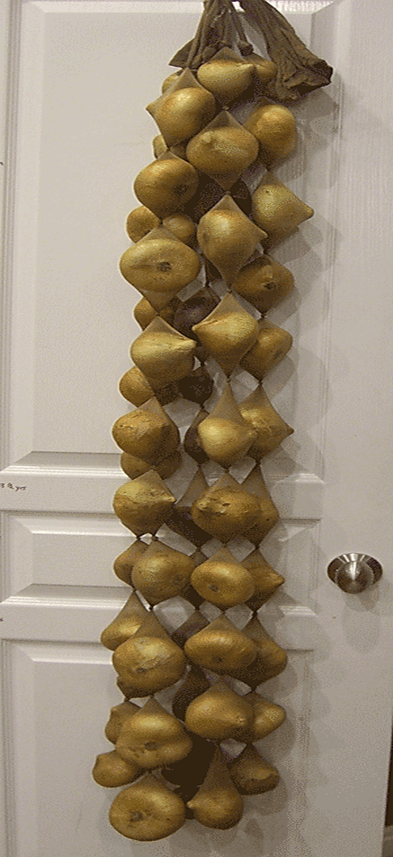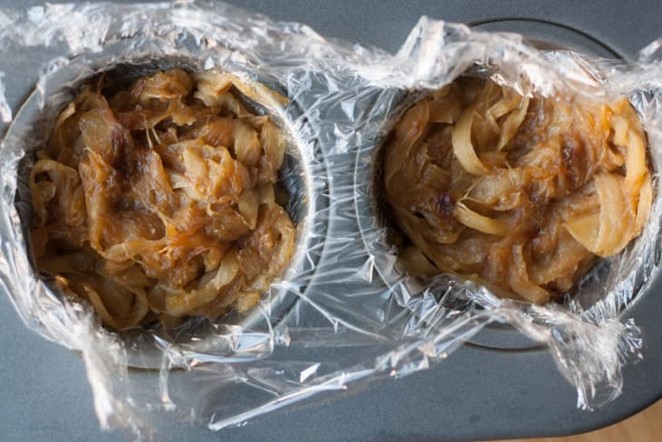”ONIONS, ONIONS yah yah yah! ONIONS, ONIONS yah yah yah! I LOVE ONIONS!”
And if you love ‘em, too, then you tend to buy a lot at a time, correct? Me too. This means we need to know how to store them properly so they don’t go bad on us. Onion-lovers know there's nothing worse than a mushy-moldy onion that's no longer usable.

Erin Alexander, food researcher for www.food52.com, shares some valuable insight on the right way to store onions, whether they're whole, peeled, sliced, or cooked.
First, whole, unpeeled bulb onions. Keep them in a spot that's cool, dark, and dry. Ventilation is also important—if you don't keep them in a spot where they can get lots of air circulation, you'll cut down their shelf life. Thus, you want to avoid storing them whole in zip-top bags or airtight containers.
Instead, store them in containers with air holes, breathable mesh bags, or even pantyhose (truly). To store in pantyhose, just drop an onion down into the toe of the leg of a clean pair, and tie a knot above it. Repeat that process with your remaining onions and hang it in a cool, dark cabinet. There's no better way to maximize airflow around your onions while simultaneously keeping them separated and moisture-free. Whenever you need an onion, simply snip one off.

Storing whole, unpeeled onions in the fridge isn’t recommended because they'll absorb moisture and become mushy more quickly that way. However, you should absolutely store peeled, cut in half, sliced, diced, or chopped onions in the fridge.
Rather than plastic, store peeled, halved, sliced, diced, and chopped onions in airtight glass containers. Plastic tends to absorb their smell. Peeled onions will last about two weeks this way, and sliced onions will last for a week to 10 days. Cooked onions will last three to five days in the fridge if they’re also in airtight containers.

Another handy trick for storing onions is to use your freezer. Not much to do here. Simply put raw, sliced onions into a freezer-safe zip-top bag, squeeze out as much air as possible, and pop it in the freezer; if you want to keep them from sticking, spread them out on a sheet-pan or shallow baking dish and freeze them for one to two hours before transferring to a container. They'll last in there for six months or more.
Erin says using your defrosted raw onions in dishes where they'll go uncooked (such as guac or salads), isn’t recommended. But they'll be perfect for stews, braises, and sauces. You'll also want to avoid using this bunch for caramelizing, too, as they can become a bit watery after a stint in the freezer.
You can, however, make caramelized onions from a freshly cut onion and freeze those; keep your frozen caramelized onions in ice cube trays, muffin tins, zip-top bags, or an airtight container.

Following these foundational tips means the world could basically be your ONION! Yah, yah, yah!

Erin Alexander, food researcher for www.food52.com, shares some valuable insight on the right way to store onions, whether they're whole, peeled, sliced, or cooked.
First, whole, unpeeled bulb onions. Keep them in a spot that's cool, dark, and dry. Ventilation is also important—if you don't keep them in a spot where they can get lots of air circulation, you'll cut down their shelf life. Thus, you want to avoid storing them whole in zip-top bags or airtight containers.
Instead, store them in containers with air holes, breathable mesh bags, or even pantyhose (truly). To store in pantyhose, just drop an onion down into the toe of the leg of a clean pair, and tie a knot above it. Repeat that process with your remaining onions and hang it in a cool, dark cabinet. There's no better way to maximize airflow around your onions while simultaneously keeping them separated and moisture-free. Whenever you need an onion, simply snip one off.

Storing whole, unpeeled onions in the fridge isn’t recommended because they'll absorb moisture and become mushy more quickly that way. However, you should absolutely store peeled, cut in half, sliced, diced, or chopped onions in the fridge.
Rather than plastic, store peeled, halved, sliced, diced, and chopped onions in airtight glass containers. Plastic tends to absorb their smell. Peeled onions will last about two weeks this way, and sliced onions will last for a week to 10 days. Cooked onions will last three to five days in the fridge if they’re also in airtight containers.

Another handy trick for storing onions is to use your freezer. Not much to do here. Simply put raw, sliced onions into a freezer-safe zip-top bag, squeeze out as much air as possible, and pop it in the freezer; if you want to keep them from sticking, spread them out on a sheet-pan or shallow baking dish and freeze them for one to two hours before transferring to a container. They'll last in there for six months or more.
Erin says using your defrosted raw onions in dishes where they'll go uncooked (such as guac or salads), isn’t recommended. But they'll be perfect for stews, braises, and sauces. You'll also want to avoid using this bunch for caramelizing, too, as they can become a bit watery after a stint in the freezer.
You can, however, make caramelized onions from a freshly cut onion and freeze those; keep your frozen caramelized onions in ice cube trays, muffin tins, zip-top bags, or an airtight container.

Following these foundational tips means the world could basically be your ONION! Yah, yah, yah!
 Alice Osborne
Alice Osborne
Weekly Newsletter Contributor since 2006
Email the author! alice@dvo.com
